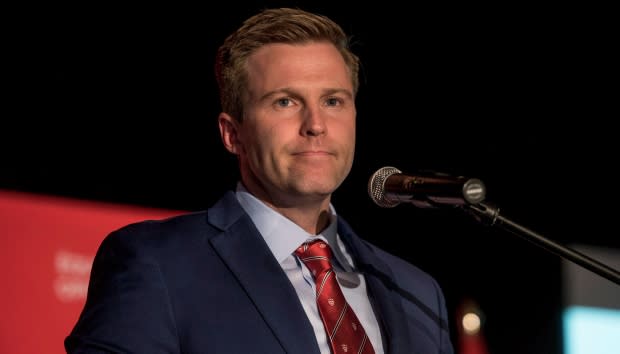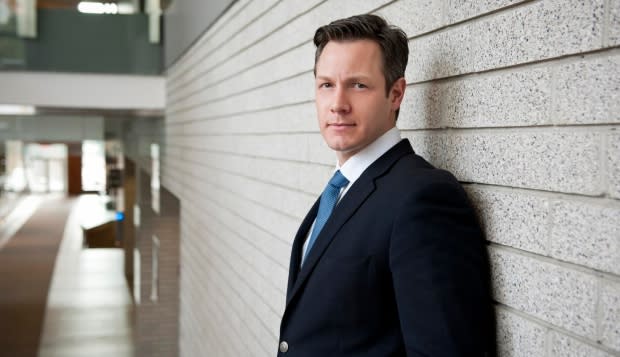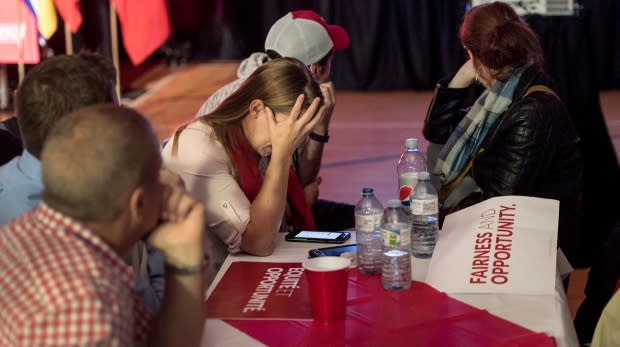Liberals get first chance to govern divided legislature, expert says
What happens now?
It's been almost a century since New Brunswickers elected a minority government, so we're all a little rusty on our British parliamentary conventions.
But Liberal Leader Brian Gallant knew what he was doing when he declared Monday night — even when the Progressive Conservatives were ahead by one seat — that he would attempt to continue governing.
"The current premier always retain the right to meet the legislature regardless of the electoral outcome," said Philippe Lagassé, an expert on the British parliamentary system at Carleton University in Ottawa.
"If the current government is returned with a minority or a plurality of seats, it can still choose to attempt to govern, or to hold confidence. There is nothing to prevent them from doing that even if another party has more seats."
With his Liberals one seat behind the PCs in the count, and with both parties short of a majority, Gallant told supporters in Grande-Digue he would meet Lt.-Gov. Jocelyne Roy Vienneau to discuss an early convening of the new legislature.
"I will discuss with her my plans to do everything we can do to work collaboratively with the other parties," he said, acknowledging that voters clearly wanted other parties to play a role in the legislature.
At that point, the PCs were leading in 22 seats while Gallant's Liberals led in 21, exactly where the final count ended up. The Green Party and the People's Alliance won three seats each.
It takes 25 seats to win a majority government in the 49-seat legislature.

Gallant has the right to attempt that because his government — the cabinet, or executive — remains in office until it resigns or is dismissed by the lieutenant-governor.
"From a strictly legal point of view, the existing premier has the right to meet the legislature regardless of the result, simply because he or she is is the premier," Lagassé said.
"That's it."
Higgs: 'I accept this mandate'
But Lagassé also said the public doesn't understand that technicality and assumes the party with the most seats wins automatically.
"Even though it's not convention that it's the party with the most seats [gets] to form government, I think it's still fair to say there's an expectation, particularly if the margins are wide enough in terms of public perception," he said.
That's a perception PC Leader Blaine Higgs was pushing on Monday night.
"I accept this mandate," he said, joking that, "I guess Brian Gallant and I will both be lined up at the lieutenant-governor's office in the morning."
Watch the N.B. election night in 90 seconds: As PCs claim victory, Liberals try to hold onto power.
Later, he added: "I'm treating this like an election victory because that's what it is right now."
He told CBC News he didn't accept that a party with fewer seats can even try to stay in office.
Convention would give Gallant a chance to govern
If Roy-Vienneau follows convention, though, she must let Gallant make the first attempt to govern.
That will mean calling the legislature, choosing a Speaker, presenting a speech from the throne, then holding the standard two-week debate on whether the legislature supports that speech.
The choice of a Speaker will itself be fraught, because if a Liberal is chosen, Gallant will be down a vote at the outset.
At the end of the two-week throne speech debate, there will be a vote — the first test of whether Gallant can win the confidence of the House.

If he loses that vote,the lieutenant-governor could then ask Higgs to form a government rather than trigger a new election.
"There must be no hiatus in government, no long breaks of delays between the defeat and resignation of one government and the swearing-in of another," former lieutenant-governor George Stanley said in 1992.
Then it would fall to the Progressive Conservatives to try to govern without a majority — by presenting its own throne speech and hoping that the other parties in the legislature will vote for it, or at least not vote against it.
Tories have 2 options in minority situation
The PCs would have two options.
They could try to forge a formal deal that would see one or both of the smaller parties prop up the Tories by agreeing to support them on confidence and budget votes in exchange for concessions on policies.
Or they could try to draft bills one at a time that would appeal to the other parties enough to win their support, case-by-case.

Some Tories were already extending olive branches to the other parties last night.
Ted Flemming, re-elected in Rothesay, pointed out that Higgs, People's Alliance Leader Kris Austin, and Green Leader David Coon share some views on fiscal prudence.
But Coon ruled out being part of any deal that includes the Alliance, saying there's "no way I can imagine being involved in any arrangement" with a party that would take away language rights or refuse to act on climate change.
Watch: Both the PCs and Liberals say they will make a case to govern.
Austin was sounding more willing to deal.
"We're willing to compromise in certain areas to make government work," he said.
Whatever happens, a Higgs PC government might not last four years.
The longer such a government gets from Monday's election, the more likely — if it loses the confidence of the House — that the lieutenant-governor would break the impasse by dissolving the legislature for a new election.
Subscribe to our election newsletter
Get the latest election updates delivered right to your inbox with The 506er. Subscribe here. And then let us know what you think by emailing us: the506er@cbc.ca.

